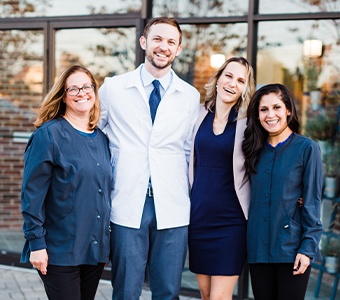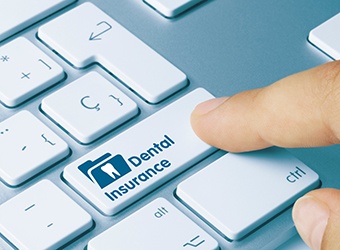By nature, dental emergencies never tend to happen at a convenient time. You might wake up on the morning of a much-deserved vacation with searing tooth pain, or maybe an accidental tumble at work leads to a serious tooth fracture. At Casco Bay Smiles, our patients’ well-being is always a top priority – that’s why you’ll never hear “We can see you in a week or two!” from our team members when you call in with an urgent situation. Instead, Dr. McVety will do his best to see you on the same day as your initial call whenever possible to provide much-needed relief and support. Don’t wait – contact us today in Falmouth, ME!
Why Choose Casco Bay Smiles for Emergency Dental Care?
- #1 Relaxing Sedation Dentistry Available for Maximum Comfort
- #2 Same-Day Emergency Appointment Available
- #3 State-of-the-Art Technology for Fast, Precise Diagnosis

What to Do in a Dental Emergency
In a dental emergency it’s easy to panic, but we encourage you to keep a level head. Acting quickly and correctly can make all the difference between losing and saving a tooth! Our experienced team here at Casco Bay Smiles is ready to guide you through your emergency and regain your happy, healthy smile. Just follow these steps:
- Step 1: Call Us As Soon As You Can. We do everything we can to see emergency patients the same day they call us, so the sooner you call us, the sooner we can help you!
- Step 2: Follow Our First-Aid Instructions. Over the phone, one of our team members will walk you through basic first-aid steps to take to manage your situation until you arrive at our office.
- Step 3: See Dr. McVety for an Emergency Exam. When you arrive, your Falmouth emergency dentist Dr. McVety will see you right away to address any pain and learn more about your emergency.
- Step 4: Review Your Treatment Options. McVety will review his findings with you and fully explain all your treatment options. Together, you’ll make a custom treatment plan for getting your oral health back on track that works for you.
- Step 5: Get the Fast, Professional Care You Need. Whether you need a filling, crown, gum disease treatment, root canal therapy, or any other service, our team will jump into action as soon as you’ve created a treatment plan, focusing on protecting your teeth and keeping you comfortable.
The Most Common Dental Emergencies
Most dental emergencies can be sorted into two distinct categories. First, there are the unexpected accidents, which can involve serious fractures or even teeth that have been completely knocked out. The other major type is the dreaded “toothache,” which left untreated can cause pain and lead to a serious infection. Keep reading below to learn more about what you can do in some of these situations to better manage your symptoms before arriving at Casco Bay Smiles:
Toothaches
Chipped Tooth
Cracked Tooth
Sensitivity to Hot & Cold
Knocked-Out Tooth
Lost Filling or Crown
Broken Denture
Loose Tooth
Gums, Lips or Tongue Injury
Jaw Pain or Clenching
Something Stuck Between Teeth

Understanding the Cost of Treating Dental Emergencies
Experiencing dental emergencies can be stressful on its own, but when you put money into the mix, the anxiety can really build up! That’s why at Casco Bay Smiles we’re committed to providing transparent pricing and flexible payment options.
Our team will always provide an honest estimate up front so there are never any surprises. Read more below to see how our Falmouth dental practice can help you find relief without stressing your budget.
Read More

Every Dental Emergency Is Different
No two dental emergencies are alike, so the cost of treatment depends on your specific needs. For example, dental bonding for a chipped tooth may cost less than repairing a severe fracture. Meanwhile, root canals and crowns involve more time and materials than treating a cavity, and severe infections or extractions may require advanced care.
At Casco Bay Smiles, our team will assess your case carefully to provide a tailored treatment plan and cost estimate. Our goal is to prioritize your relief, restore your smile, and provide the tools you need to finance your treatment, no matter the situation.

Does Dental Insurance Cover Dental Emergencies?
Dental insurance often covers a portion of emergency care, but the exact amount varies by provider and plan. Most plans include benefits for necessary procedures like extractions, root canals, or temporary restorations. However, it’s important to review your policy or contact your insurance provider to get the details.
At our Falmouth office, we’ll be happy to work with you and your insurer to maximize your benefits and reduce out-of-pocket costs. Just contact us before your appointment and we’ll set aside some time to help you sift through your policies' emergency coverage.

Other Options for Making Dental Emergencies Affordable
We understand that unexpected dental emergencies can strain your budget. That’s why we proudly partner with CareCredit, a trusted third-party financing provider. This flexible program works like a credit card for health coverage, allowing you to pay for all your treatment at once. Then, you can break down the balance into manageable monthly payments, often with low or no interest!
Our team can help you apply for CareCredit right in our office or guide you through the online process. With CareCredit, you can prioritize your oral health without delaying the care you need!

Taking Care of Your Smile Can Save You Money
As the old saying goes, “An ounce of prevention is worth a pound of cure.” Preventive care is the best way to avoid costly dental emergencies! Here are a few tips for protecting your smile:
- Wear a mouthguard during sports or a nightguard if you grind your teeth while you sleep.
- Keep up with your oral hygiene routine by brushing twice a day with fluoride toothpaste and flossing every night.
- See us at least twice a year for dental checkups and cleanings to check on your smile and keep it clean.
- Use any insurance benefits you have as early as possible, especially for preventive care that is often covered 100 percent a certain number of times per year.
By investing in prevention, you save money, time, and discomfort while keeping your smile healthy and strong.

Keys to Preventing Dental Emergencies
It’s no secret that dental injuries can be painful to experience and stressful to handle. That’s why we do our best to help our patients avoid them altogether! With this in mind, keep reading to learn some helpful tips for how to minimize your odds of experiencing a dental emergency as you go about your daily life:
Read More

Visit Your Dentist Twice a Year
At your biannual visits, Dr. McVety covers a lot of ground – from screening for oral cancer to examining the condition of any existing dental work. The goal? To pinpoint any concerning issues, like decay, and successfully prevent the need for more extensive treatment down the road.
It’s also worth noting that the cleaning portion of your visits allow our hygienists to remove harmful substances, like plaque, before they build up and wreak havoc on your oral health. So, if it has been more than six months since your last checkup and cleaning, call us to get your next appointment on the calendar!

Maintain Good Oral Hygiene At Home
A solid oral hygiene regimen will go a long way in preventing common oral health problems, including tooth decay and gum disease. So, if you want to keep your smile healthy, you need to incorporate healthy habits into your daily routine, like brushing twice a day and flossing daily.
Tip: Unsure which toothbrush, toothpaste, floss, or mouthwash to use? Let us know! We can share our recommendations with your unique dental needs in mind.

Break Bad Habits
Smoking is a habit that can lead to everything from bad breath and stubborn stains to oral cancer, which is why we strongly recommend quitting. We also encourage our patients to break other habits that have the potential to negatively impact their teeth and gums, like chewing on ice cubes, biting their nails, or using their teeth as tools to open things.

Be Mindful of What You Eat
As we mentioned above, chewing on ice cubes can lead to a serious chip, crack, or fracture. For that same reason, we don’t recommend eating extremely crunchy foods or ones that are overly tough, sugary, or sticky. Instead, fill your plate with foods that benefit your oral health, like seasonal fruits, fresh vegetables, and lean protein. It’s also important to drink lots of water (this will help you stay hydrated while also preventing dry mouth)!

Wear a Mouthguard During Sports
Whether you prefer running, riding your bike, or lifting weights, it’s important that you wear a mouthguard when you’re active. That way, your teeth and gums are protected from unforeseen impact – whether from an unexpected fall or chronic grinding/clenching. If you don’t have one already, let us know! We can have a custom mouthguard made for you.
Important note: If you grind or clench your teeth at night, you should also wear a mouthguard to prevent chips and cracks as well as premature wear and tear.

Dental Emergency FAQ’s
Keeping a cool head and making the right decisions when every second counts could end up saving your smile during a dental emergency. Each bit of information helps during an urgent situation, but you may not be in the right frame of mind to ask questions when you’re actively dealing with a toothache or a dental injury. Thus, we have provided the answers to some of the questions that are most frequently asked of emergency dentists.
Read More
Should I Visit the Dentist or the Emergency Room?
Dr. McVety has training and experience treating a variety of oral health issues that many doctors at a hospital emergency room won’t be as well-equipped to deal with. Call Casco Bay Smiles if you’re suffering from common problems such as persistent toothaches, broken or lost teeth, and infections that do not affect your ability to breathe or swallow. That said, some cases are more life-threatening and should be brought to the attention of the nearest emergency room right away. This might include a deep cut that is causing unstoppable bleeding, any kind of breathing difficulty, or a fractured or dislocated jaw.
Do I Need to Visit the Dentist Right Away?
There are two main reasons why dental emergencies require immediate attention. First, they will not get better on their own; in fact, they will only get worse. Infections will continue to grow and spread, and teeth that were already injured will likely break further from daily use if not treated. The fact that the situation will only become more severe over time leads right into the second reason: if you wait for too long, you could end up needing a more expensive or complex treatment to salvage the function of your mouth. As such, as soon as you realize that something is wrong, you should get in touch with Casco Bay Smiles immediately.
Why Should Knocked-Out Teeth Be Kept In Milk?
While it’s best to keep an avulsed tooth in its socket whenever possible, there are situations where it might be difficult or impossible to do so. Fortunately, a glass of milk is often a great alternative in these situations. The ultimate goal is to keep the roots of the tooth moist so that they have an easier time reattaching to the jaw later. Milk is usually ideal for this purpose because it contains proteins that will help keep the cells of the tooth roots alive and protect them from further damage.
Do I Need a Root Canal?
We might suggest emergency root canal therapy if we examine your tooth and find signs of an infection. Removing the diseased tissue along with all the harmful bacteria present inside of the tooth is usually the most reliable way to stop the infection from spreading beyond the roots. Do not worry about discomfort; the procedure will actually stop the pain caused by a toothache, and in the long run it will let you save a tooth that would otherwise have needed to be Extracted.
Toothaches
Is My Toothache a Dental Emergency?
Your teeth shouldn’t hurt, so don’t ignore this pain. It could mean that the tooth is deeply infected or has an abscess and needs professional treatment. In any case, tooth pain means something is wrong and merits an emergency appointment. Without our team’s intervention, the decay will only spread and further harm your smile.
How You Should Handle a Toothache
After you call our office for an emergency visit, you can take pain medication you can buy from a drugstore to manage your discomfort. You can also place a cold compress on your face to reduce any swelling and to further help with pain. If you can, floss around the tooth that is causing you trouble, just to be sure that nothing is stuck. Rinse with warm saltwater to keep your mouth clean, and avoid eating with that area of your teeth.
How We Treat Toothaches
Our first priority is to relieve your pain with a local anesthetic, which numbs that entire area of your mouth. If the problem is in fact a deep cavity, we will remove the decayed structure and tissue. Keep in mind that root canal therapy may be necessary. Then, we’ll restore the tooth with a filling or a dental crown, depending on how damaged the tooth is.
Learn More about Root Canal Therapy
Learn More about Dental Crowns
Chipped Teeth
Is a Chipped Tooth a Dental Emergency?
Although a chipped tooth can sometimes be a purely cosmetic problem, it is still considered a dental emergency because it can significantly impair a patient’s appearance. Plus, there’s the risk of having a sharp edge or point on the tooth that could harm soft tissues. As a result, we encourage you to reach out to us if you have this problem.
How You Should Handle a Chipped Tooth
Try to find and bring the piece(s) of your tooth to your appointment. While eating, if you must, avoid using that area of your mouth. If your tooth is sharp, you need to cover it with dental wax, which you’ll find at any drugstore, or with sugar-free gum to protect your tongue, cheeks, lips, and gums.
How We Treat Chipped Teeth
If the damage is minor, we may be able to reassemble the tooth by adhering the pieces with composite resin, but in most cases, we must fill in the chipped portion with the resin or cover the tooth with a porcelain veneer.
Learn More about Cosmetic Dental Bonding
Learn More about Porcelain Veneers
Cracked Tooth
Is a Cracked Tooth a Dental Emergency?
Whether you’ve bitten on something too hard or suffered a sports injury, cracking a tooth can not only be a painful experience but also expose the more sensitive inner layers of the tooth to bacteria and infection. To avoid more damage to the tooth, it needs to be addressed right away.
How You Should Handle a Cracked Tooth
When you’ve called us for an immediate appointment, rinse your mouth with warm saltwater to keep the tooth clean and to prevent triggering sensitivity. To keep bacteria from gaining access, you can cover the tooth with sugar-free gum. If you must eat, avoid contact with that area of your mouth.
How We Treat Cracked Teeth
In most situations, we can repair the tooth and hold it together using a dental crown. Depending on how deep the crack is, we may need to do a root canal, but if it goes below the gumline, the entire tooth may need to be extracted. If this is the case, we will then discuss your replacement options, namely a dental bridge and an implant.
Learn More about Dental Crowns
Learn More about Dental Implants
Very Sensitive Teeth
Are Very Sensitive Teeth a Dental Emergency?
Dental sensitivity occurs when outside stimuli are allowed to irritate the inner layers of a tooth, such as the enamel or pulp. This can happen for a number of reasons, some of which merit a visit to an emergency dentist in Falmouth.
How You Should Handle Sensitive Teeth
Call our office and describe the situation. Depending on what you say, we might urge you to come in for an appointment as soon as you can. However, it is also possible that we will give you tips for at-home care until it is more convenient for you to visit us. For example, we might urge you to cut back on hot and cold foods or switch to a sensitivity-reducing toothpaste.
How We Treat Tooth Sensitivity
The best treatment for sensitive teeth depends on what is causing the problem. In some cases, something as simple as prescription mouthwash or desensitizing toothpaste is all that is necessary. However, if you have spots of decay or damage, you might need a filling, root canal therapy, or a crown. If receding gums are to blame for the sensitivity, you may require gum disease treatment.
Learn More About Tooth-Colored Fillings
Learn More About Gum Disease Therapy
Learn More About Root Canal Therapy
Knocked-Out Tooth
Is a Knocked-Out Tooth a Dental Emergency?
A lost tooth in Falmouth is one of the most urgent dental emergencies you could face. To increase the chances that the tooth can be preserved, you should receive care within an hour or so of it getting knocked out.
How You Should Handle a Knocked-Out Tooth
Locate the tooth and pick it up, touching it only by the crown (the part you normally see above the gumline). Gently rinse off any debris, and then find a way to keep it moist. Ideally, you should place it back in its original socket. If that is not possible, you can tuck it between your cheek and gums, store it in milk, or use a tooth preservation kit from a local pharmacy. Do not store it in water or any acidic liquids because they could damage it.
How We Treat Knocked-Out Teeth
We will evaluate the situation and determine if it is possible to splint the tooth back into its original place. If it is, your body should gradually reintegrate it. If saving the tooth is not possible, we will tend to the damage to your oral tissues and talk to you about your tooth replacement options. You may be eligible for a dental implant, fixed bridge, or partial denture.
Learn More About Dental Bridges
Learn More About Dental Implants
Lost Filling or Crown
Is a Lost Filling or Crown a Dental Emergency?
A lost filling or lost dental crown in Falmouth is not an extremely urgent emergency. However, because your exposed tooth could easily incur further harm, you should still seek treatment in a timely manner.
How You Should Handle a Lost Filling or Crown
You might be able to temporarily reattach a lost restoration with a dab or toothpaste or dental cement. However, if it does not want to fit back in its original place, do not force it. Instead, store it in a small container with a lid and bring it to your dental appointment. You should also be careful not to chew with the exposed tooth.
How We Treat Lost Fillings or Crowns
In some cases, we are able to permanently reattach a lost restoration. In other instances, we must place an entirely new crown or filling. Occasionally, we must also perform additional restorative treatment on a damaged tooth.
Learn More About Tooth-Colored Fillings
Learn More About Dental Crowns
Broken Denture
Is a broken denture a dental emergency? Yes! You should not continue wearing your broken or damaged denture. Otherwise, it can injure your gums, soft tissues, jaws, and remaining teeth. Contact our office right away and we’ll see you as soon as possible to fix your prosthetic.
How to handle a broken denture: The best thing you can do is give us a call to get an appointment scheduled with us immediately. We’ll try and see you that very same day to resolve your situation. Do not wear a broken denture or attempt to fix it yourself at home! You could end up doing more harm than good for your health.
How we treat broken dentures: Our team will need to assess the extent of the damage to determine the best treatment option. Depending on the severity of your case, composite resin can be used to repair a small chip or crack. Sometimes the denture will need to be readjusted to fit properly or you’ll have to order a replacement altogether.
Learn More About Dental Implants
Learn More About Implant Dentures
Loose Permanent Tooth
Is a loose permanent tooth an emergency? Also known as a partially dislodged tooth, a loose permanent tooth can occur because of injury or severe infection. Even if there’s no pain present, you should contact us right away to make an emergency appointment.
How you should handle a loose permanent tooth: Contact us immediately and explain your situation. We’ll try and get you seen that very same day for treatment. In the meantime, you should avoid touching your tooth and eating any hard or sticky foods. Keep your mouth clean by rinsing it with warm water.
How we treat loose permanent teeth: If your tooth cannot be saved with a splint or another treatment, we may need to extract it. In that case, you’ll have to explore your replacement options like dental implants or bridges.
Learn More About Tooth Extractions
Learn More About Dental Implants
Learn More About Gum Disease Therapy
Learn More About Sports Mouthguards
Injury to the Gums, Lips, or Tongue
Is an injury to the gums, lips, or tongue a dental emergency? Oral injuries can be quite alarming, especially when they bleed a lot. Fortunately, we might be able to help if your bleeding is minor.
How you should handle an injury to the gums, lips, or tongue: Carefully rinse your mouth with water to remove any lingering debris that’s present. Then, you can apply a washcloth or gauze to the cut until the bleeding stops. A cold compress can also be used to reduce swelling and discomfort.
How we treat injuries to the gums, lips, or tongue: If the wound is small enough, we may be able to stitch it closed and help keep the area clean. On the other hand, it’s strongly recommended that you go to the emergency room if your cut is very large or the bleeding doesn’t stop after 10 minutes of applying pressure.
Learn More About Sports Mouthguards
Jaw Pain
Is jaw pain a dental emergency? Jaw pain can occur for a variety of reasons. Although it can affect your day-to-day life, it’s not typically considered an emergency unless it becomes chronic. You need to contact our office right away to avoid sudden and serious oral health issues down the line.
How you should handle jaw pain: When you give us a call, we’ll provide first-aid instructions over the phone to help you manage your situation at home. Usually, we recommend taking over-the-counter pain medication or using an ice pack to relieve swelling or discomfort. If you think your jaw is broken or dislocated, make sure you head to your nearest emergency room for medical attention.
How we treat jaw pain: We may recommend a custom-made mouthguard to help address your pain. Not only will it provide relief to your jaw joints, but it can prevent serious issues later in life. If your wisdom teeth are impacted and causing pain, removing them may be the ideal solution depending on your condition.
Learn More About Nightguards for Bruxism
Something Stuck Between the Teeth
If there is something stuck between your teeth, try using waxed dental floss to remove it. By gently moving the floss back and forth, you should be able to dislodge the object and notice a decrease in pain. If it appears there is nothing stuck between your teeth, it may be that your toothache is caused by an infection inside the tooth. Only our team will be able to determine if this is the case, so you will need to get in to see us as soon as possible, as you might need root canal therapy or another form of restorative treatment.